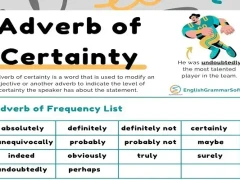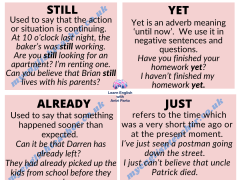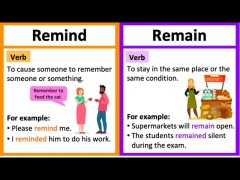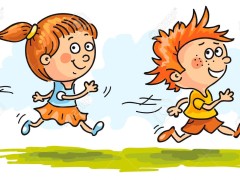better [ˈbetə] adj. 形容词well 的比较级
【反】worse 更差的
【搭】better and better 越来越好
be better than...比……更好
* * *
A: I hope you feel better soon.
B: Thank you for your concern.
A:我希望你早日好转。
B:谢谢你的关心。
* * *
certainly [ˈsəːtənli] adv. 当然
get up 起床
yet [jet] adv. 还,仍
rich [ritʃ] adj. 油腻的
food [fuːd] n. 食物
【扩】prog 食物
【搭】sea food 海鲜 western food 西餐
* * *
A: All the food smells tasty today and makes my mouth water.
B: Let's line up here. This line seems a little shorter.
A:今天所有的食物闻起来都很香,让我流口水。
B:我们在这儿排队吧。这一队看起来短些。
* * *
remain [riˈmein] v. 保持,继续
【派】remaining 剩余的 remains 遗迹
【搭】remain healthy 保持健康
* * *
A: Please remain calm.
B: Sorry, I was so excited.
A:请保持镇静。
B:对不起,刚才我太激动了。
Lesson 64 Don't...!不要……!
play [plei] v. 玩
【派】player 比赛者 playground 操场
【搭】play games 玩游戏
play basketball 打篮球
play the piano 弹钢琴
* * *
A: What do you have in mind about the weekend?
B: I was thinking we could invite over a few close friends and play cards.
A:对周末你有什么想法了吗?
B:我想过我们可以邀请一些比较熟的朋友来玩纸牌游戏。
* * *
match [mætʃ] n. 火柴
【派】matchstick 火柴杆 match box 火柴盒
【搭】strike a match 划火柴
* * *
A: Could you give me a box of matches?
B: Sorry, we only have some lighters.
A:你能给我一盒火柴吗?
B:对不起,我们只有打火机。
* * *
talk [tɔːk] v. 谈话
【派】talker 健谈者 talkative 话多的
【搭】talk about 谈论
* * *
A: May I talk to you now?
B: Can you wait a minute? I have no time now.
A:我现在能跟你谈谈吗?
B:你能等一会儿吗?我现在没时间。
* * *
library [ˈlaibrəri] n. 图书馆
【派】librarian 图书管理员
【扩】renew 续借
【搭】in the library 在图书馆
* * *
A: Will your roommate mind if I come over to your room to study?
B: She is having some friends over tonight, so let's go to the library.
A:假若我去你们房间学习,你的室友会介意吗?
B:她今晚和一些朋友要熬通宵,所以我们还是去图书馆吧。
* * *
drive [draiv] v. 开车
【派】driver 司机
【扩】steer 驾驶
【搭】drive a car 开车
drive sb. home 带某人回家
* * *
A: Are you going with a package tour?
B: No, I want to drive there.
A:你参加包办旅游了吗?
B:没有,我想开车去那儿。
* * *
so [səu] adv. 如此地
【搭】so that 所以 so so 马马虎虎
or so 左右 even so 即便
* * *
A: I've got so much work to do.
B: Do you need my help?
A:我有好多事要干。
B:需要我帮你吗?
* * *
quickly [ˈkwikli] adv. 快地
【构】quick(快的)+ly(副词词缀)=quickly(快地)
【反】slowly 慢地
【搭】move quickly 快速移动
* * *
A: You should work more quickly.
B: But it is the quickest.
A:你得干得快点儿。
B:但这已经是最快了。
* * *
lean out of 身体探出
break [breik] v. 打破
【派】breaker 浪花
【扩】smash 打破
【搭】break the record 打破记录
break into 闯入
break down 粉碎 break away 逃走
* * *
A: He did very well, but he failed to break the record.
B: It's a pity to him.
A:他干得很好,可是没能打破纪录。
B:这对他来说是个遗憾。
* * *
noise [nɔiz] n. 喧闹声
【派】noisy 嘈杂的 noiseless 寂静的
【扩】sound 声音
【搭】make a noise 吵闹
* * *
A: Do you know where the noise is coming from?
B: I think it's from the street. My room is too near to the street.
A:您知道噪声是从哪儿传来的吗?
B:我想声音是从街上传来的,我的房间离马路太近了。
adjective [比较级]较好的,更好的;能力更强的,更熟练的;(健康状况)好转的,康复的;更合适的,更得体的 - If you are better after an illness or injury, you have recovered from it. If you feel better, you no longer feel so ill.
adverb [程度副词]较好地,更好地;更,更大程度上;更妥,更恰当 - If you like one thing better than another, you like it more.
noun [抽象名词]更好的事物,较好者;更好的表现,更好的待遇;<旧>上司,比自己能力强的人;打赌者(=bettor) - a person who is superior, esp in social standing or ability
verb [vi. 不及物动词]超过,胜过;改善,改进 - You'd better not do that again.
pronoun [指示代词]更大成就,更好待遇,更好行为 - We expect better of you in the future.
adverb [方式副词]无疑,确定;当然,行(用于回答) - The public is certainly getting tired of hearing about it.
noun [抽象名词]起床:离开床铺并开始活动。 - Stay in bed extra late or get up specially early.
adverb [方式副词]仍然,还;现在,此刻;迄今为止,到目前为止;还需,还差;终归,迟早;又,甚至(强调增加或重复);然而,尽管 - No decision has yet been made.
conjunction [推进连词]然而,但是 - I'm not finished with you yet.
adjective [原级]有钱的,富有的;富含…的,丰富的;非常有趣的,丰富多彩的;(食物)油腻的;(色彩、气味)浓郁的,(声音)浑厚的;肥沃的,丰产的;华丽昂贵的;<非正式>(指某人的评论或批评)荒唐的,可笑的;值钱的,生财的;(内燃机内的混合燃料)可燃性成分高的 - A rich country has a strong economy and produces a lot of wealth, so many people who live there have a high standard of living.
noun [专属名词](植物生长的)养料;食物,食品 - Her speech offers much food for thought.
a lot of food 食品不可数
- rich food, 油腻的食物
- mild food, 清淡的食物
- spicy food,辛辣的食物
- green food, 绿色食品
- fast food, 快 餐
- sea food, 海鲜
verb [vi. 不及物动词]逗留,留下;剩余,遗留;保持不变,一直是;仍需去做(或处理) - If you remain in a place, you stay there and do not move away.
noun [抽象名词]剩余(物),遗迹;遗体,残骸 - The remains of something are the parts of it that are left after most of it has been taken away or destroyed.
verb [vi. 不及物动词](尤指儿童)玩,玩耍;捉弄,戏弄;随意摆弄,弄着玩;玩弄(~ with);耍弄,愚弄;儿戏似的做,不认真地干(~ at);干,闹;参加(游戏、比赛等);与…比赛;踢(球),击打(球);(比赛中)走(子),出(牌);派(某人)上场;(在运动队中)打(特定位置),司职…;扮演,演出 - They played in the little garden.
noun [抽象名词]剧本,戏剧;(尤指儿童的)游戏,玩耍;一段时间的玩耍;比赛;(比赛中进行某个动作的)时刻;(运动,游戏)动作,方式;(运动或游戏中的)打法,走法;活动空间,间隙;球处于可按规则进行比赛的状态;影响,作用;闪动,跳动,波动;玩笑;(喻)自由度,运作范围,回旋余地;(某一首歌曲在电台的)播放次数,播放时长;(音频或图像的)播放次数,播放 - They've got more exciting players and a more exciting style of play.
noun [具体名词]比赛,竞赛;火柴;敌手,旗鼓相当的人;相配的人(或物);非常相似的东西;婚姻,配偶;适合,匹配 - A match is a small wooden stick with a substance on one end that produces a flame when you rub it along the rough side of a matchbox or a matchbook.
verb [vt. 及物动词]比得上,敌得过;使成对,使相配,使相称;与…一致,与…相符;使较量,使竞赛;适应,满足;等额提供 - If you match something, you are as good as it or equal to it, for example in speed, size, or quality.
verb [vi. 不及物动词]说话,交谈,谈话;谈论(某个话题);谈心;谈判,商讨;(就某一主题)演讲,作报告;(用某种语言)讲,说;说服;有说服力;供出消息,招认,泄露秘密;议论,说闲话;指的是,说的是(用于描述尺寸、数量等);说,讲(有理、无理的话);批评,责备;(用信号、数字等)交流,传递信息;模仿说话的声音 - If you talk to someone, you have a conversation with them. You can also say that two people talk.
noun [抽象名词]谈话,交谈,讨论;(政府或组织之间正式的)谈判,商谈,洽谈;(专题)报告,演讲;空谈;谣言;话题;说话的方式;(尤指比较严肃的)一段谈话;闲谈 - That's not the kind of talk one usually hears from accountants.
noun [专属名词]图书馆,藏书楼;(书、激光唱片等的)私人收藏;书房,书斋;文库,系列丛书(激光唱片集,成套录像等);软件库 - The library is all on one level.
verb [vt. 及物动词]驾车送(人);迫使,驱使;驱赶;敲,击;猛踢,猛击(球);驱动;吹,刮;凿,挖掘;开车,驾驶 - If you drive someone somewhere, you take them there in a car or other vehicle.
noun [抽象名词]驱车出行;强烈欲望,本能需求;私人车道;有组织的努力,运动;干劲,驱动力;驱动器;猛踢,猛击;驱赶,围歼;(用于路名)路,大道;<英>(有组织的)惠斯特牌戏等的比赛;(有自动传动装置的汽车的)自动挡;(从球座上)发球 - A drive is a trip in a car or other vehicle.
drive to… 开车去往某地 v. 开车, 驾驶 (drove, driven, driving)
- I drove to Tianjing yesterday
drive sb. away from 把某人赶走 vt. 赶,驱赶,围赶(猎物、敌人等)
- He took two women hostage and forced them to drive away from the area. 他劫持了两名女人质并强迫她们开车离开这个地区。
- It is a short drive away from the Bugis and the nearest station is Aljunied. 这是一个短期的车程从武吉士和最近的车站是阿裕尼。
- If only you would slay the wicked, o God, and drive away from me the violent! 天主,恨不得你能杀掉恶人,叫流人血的凶手远离我身!
drive sb. out of 把某人赶出去
- During the war, many people were driven out of their homes.
drive sb. back 撵回去
- Our army drove the enemy back.
drive sb. mad 逼疯 vt. 逼迫,迫使
- The death of all her children has driven her mad.
adverb [程度副词]如此,这么;确是如此 - I've never felt so humiliated.
conjunction [并列连词]所以;因此 - So you're a runner, huh?
pronoun [指示代词]这样 - Uh, yeah, I guess so.
adverb [程度副词]快速地;很快,马上;短暂地,匆匆地 - Her health degenerated quickly.
noun [抽象名词]探出:从某个地方向外伸出身体的一部分,通常是为了看得更清楚或够到某物。 - It is dangerous to lean out of the window while the bus is in motion.
verb [vi. 不及物动词]打破,打碎,折断;(人或动物)骨折;(使)(表层、盖子或密封)破裂,撕开;割破,擦破(皮肤);打破(纪录);得分(低于或高于规定总分);超过;打断,打破(沉默);结束(困难或不利局面),打破(僵局);断绝,中断 - If the weather breaks or a storm breaks, it suddenly becomes rainy or stormy after a period of sunshine.
noun [抽象名词]裂缝,缺口;骨折,骨折处;停顿,暂停;间歇,小憩;课间休息;(电台或电视节目)插播广告的间隙;短假;机会,机遇;结束,断绝;(因情感作用)嗓音突变 - A break is a short period of time when you have a rest or a change from what you are doing, especially if you are working or if you are in a boring or unpleasant situation.
| 基本用法 打破,折断,损坏 | Don't break the window with the ball. 不要用球把窗户打破。 He broke his leg in the accident. 他在事故中摔断了腿。 |
|---|---|
| 违反,打破(规则、记录) | It is illegal to break the law. 违反法律是非法的。 She broke the world record for the 100-meter dash. 她打破了100米短跑的世界纪录。 |
| 中断,暂停 | Let's break for lunch at noon. 我们中午休息一下吃午饭。 The meeting broke at 3 p.m. 会议在下午3点中断了。 |
| (消息)泄露,传播 | The news of the scandal broke yesterday. 丑闻的消息在昨天泄露了。 The story broke on social media. 这个故事在社交媒体上传开了。 |
| 打破(沉默),开始 | He waited for the silence to break. 他等待沉默被打破。 The storm broke just as we got inside. 我们刚一进屋,暴风雨就开始了。 |
| (习惯)戒除 | It's hard to break a bad habit. 很难戒掉一个坏习惯。 |
| 破晓 | We will start our journey at day break. 我们将在天亮时开始我们的旅程。 |
| (关系)破裂 | They decided to break up after five years together. 他们决定在在一起五年后分手。 |
| break 休息;中断;断裂 | Let's take a short break before we continue. 在我们继续之前,先休息一下。 I need a break from all this studying. 我需要从所有这些学习中休息一下。 |
| lucky break 好运气,意外的好机会 | Getting that job was a real lucky break. 得到那份工作真是个好机会。 |
| coffee break 咖啡休息时间 | We have a coffee break at 10 a.m. every day. 我们每天上午10点有咖啡休息时间。 |















